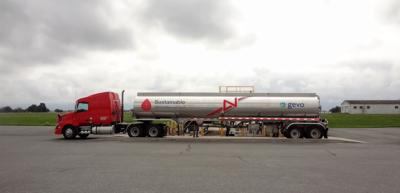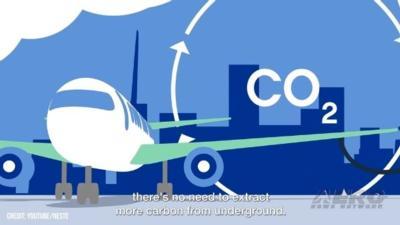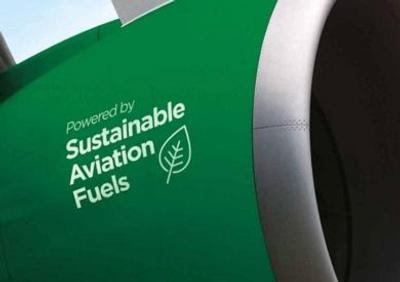Pursuing Eco-Prominence
Energy giant Repsol—the Madrid-based Spanish multinational energy and petrochemical company—has bought, for better or worse, into Europe's mad scramble to produce so-called Sustainable Aviation Fuels (SAF) in volume. Nevertheless, the company asserts the €200-million ($217-million) plant it’s building in southeast Spain will contend with difficulties peculiar to the E.U.—difficulties it would not face were it located in North America.

Repsol’s nascent plant, which will transform used cooking oil into SAF, has attracted a large number of customers. Nevertheless, the company has impugned Europe’s investment environment, arguing that overregulation and excessive taxation will hamstring the SAF industry and curtail its rise and maturation.
Repsol’s Madrid director for aero-fuels stated: "There is [in Europe] a legal instability and a regulatory machinery that is very complex and very discouraging towards seeking new solutions. We see the U.S. is very in favor of helping companies with financing and focusing on helping them to develop new things."
Repsol's concerns echo those of Europe's aviation sector, much of which is tasked with boosting SAF use to ten-percent of all jet fuel by 2030—notwithstanding the stone-cold fact that SAF currently costs as much as five-times more than conventional jet-fuel.
As one of the only thus-far-popularized means by which to decarbonize aviation, E.U. regulators are pushing airlines to increase SAF usage, warning that SAF usage may well determine whether airlines can be considered sustainable under the European Union's eminently restrictive, economically-damning, green-finance rules.
SAF currently makes up less than one-percent of the total jet-fuel in global use. Airlines, which operate on razor-thin margins and remain heavily indebted as they continue to recover from COVID, contend more needs to be done to boost SAF production—thereby lowering its cost.
Even as U.S. firms benefit from tax incentives implemented to boost SAF production, the E.U.’s central government has focused on mandating change rather than incentivizing means by which to catalyze it. So stated Laurent Donceel, acting managing director of the lobbying group Airlines for Europe.
Following the mid-March 2023 publication of the E.U.'s Net Zero Industry Act, Mr. Donceel remarked: "It seems the E.U. is more focused on window dressing and letting the United States eat it for breakfast. … Europe needs to step up and throw its weight behind a domestic SAF industry to ensure it does not fall behind."
Supporters of the E.U.’s approach make the argument that the historically-profitable energy industry ought be able to ensure supply, adding that the harmonized U.S. tax system is better designed to benefit from incentives, such as those in the controversial Inflation Reduction Act, than Europe's patchwork of national systems.
Contrariwise, energy concerns maintain they are struggling to front the investment monies needed to scale up SAF production. Repsol has thus far synthesized only enough SAF to power test flights for IAG-owned Spanish air-carrier Iberia.
IAG, is an Irish-Anglo-Spanish multinational airline holding company formed in January 2011 following a British Airways-Iberia Airlines merger by which both carriers became wholly owned subsidiaries of IAG. Since its creation, IAG has expanded its portfolio by purchasing British Midland Airways (BMI) (2011), Spanish low-cost airline Vueling (2012), and Aer Lingus (2015). The Group also owns the low-cost airline brand Level and the reward currency program Avios.
Ralf Diemer, managing director of the energy industry group, the eFuel Alliance averred: "They [European governments] would need to bind themselves to certain prices for ten to 15-years, because, otherwise, your producer doesn't have the investment security ... that's the problem.”

Finland-based Neste, the world's largest SAF producer, is expanding its facilities in Europe and elsewhere, but points to challenges, including sourcing raw materials. Currently 1,300-gallons of potable water are required to produce a single gallon of SAF from grain feedstocks. The water is expended in the processes of crop irrigation, fermentation, and refinement of the end SAF product.
Even with governmental investment, new SAF plants take years to build, leaving little time to produce the volumes mandated by E.U. lawmakers—Neste added.
Neste vice-president of renewable aviation Jonathan Wood stated: "In 2026, we will have over six-and-a-half-million tons ... of renewable [product] capacity, of which one-third will be SAF capacity. That's 2.2-million tons. That's a bit under one-percent of global aviation fuel demand.”
To date, IAG has committed $865-million to purchase and support production of SAF. Nevertheless, the company has guaranteed only 25-percent of its 2030 supply target. Ergo, actualization of its E.U.-mandated SAF goals will likely require IAG to invest billions of additional dollars.
IAG set forth: "America's program of both federal and state incentives for SAF production is the mark of global leadership on the net-zero transition. … This is a brilliant model, but if Europe cannot keep up it will have to import SAF. Let's not import SAF; let's create it everywhere we need it."

Smaller SAF producers, such as Velocys and Fulcrum, are hoping to build facilities and scale-up SAF production in the coming years. Energy sector pundits posit that even in the event SAF production efforts such as those undertaken by Velocys and Fulcrum fail to meet the E.U.’s specious production schedules, global production of SAF will increase nonetheless.
Columbia Threadneedle Investments climate analyst Joe Horrocks reported: "Most companies we speak with have already secured sufficient SAF supply to meet at least half of their 2030 procurement targets, which is exactly the market signal needed to support further SAF scale up.”
The first batch of SAF synthesized from used cooking oil at Repsol's Cartagena plant will ship in 2023’s fourth quarter. How much more of the stuff the Spanish energy titan stands to make—and at what cost—remains to be seen. Currently, Repsol is investing an additional €103-million in yet another SAF plant which the company estimates will open in 2025.
 Aero-News: Quote of the Day (05.09.24)
Aero-News: Quote of the Day (05.09.24) ANN's Daily Aero-Term (05.09.24): Hold Procedure
ANN's Daily Aero-Term (05.09.24): Hold Procedure ANN's Daily Aero-Linx (05.09.24)
ANN's Daily Aero-Linx (05.09.24) Airborne 05.03.24: Advanced Powerplant Solutions, PRA Runway Woes, Drone Racing
Airborne 05.03.24: Advanced Powerplant Solutions, PRA Runway Woes, Drone Racing Airborne-NextGen 05.07.24: AI-Piloted F-16, AgEagle, 1st 2 WorldView Sats
Airborne-NextGen 05.07.24: AI-Piloted F-16, AgEagle, 1st 2 WorldView Sats





